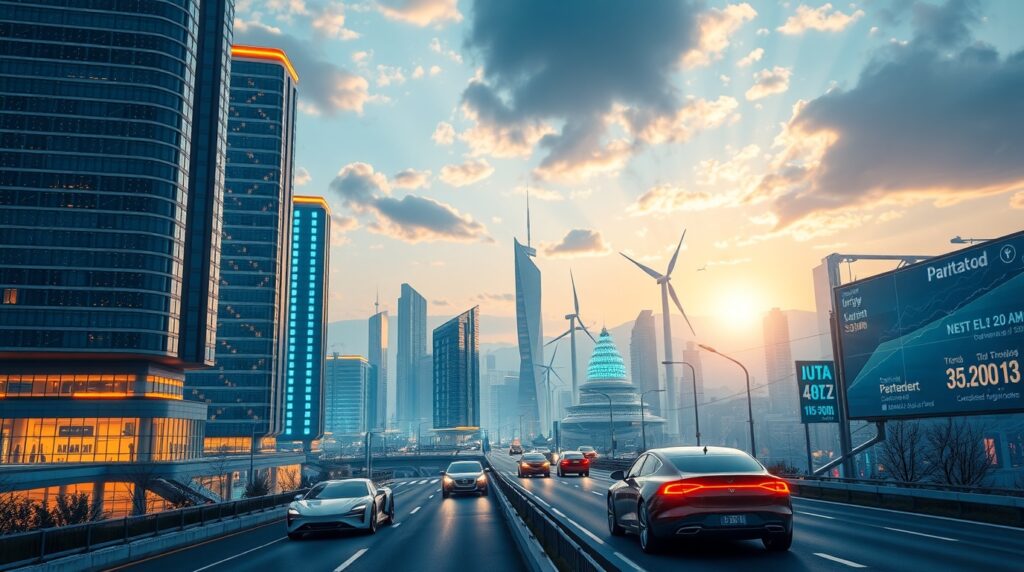The Green Gold Rush: When Capitalism Found Its Conscience
Money has always had a strange sense of morality. For centuries it happily financed coal mines, oil rigs, and smoke-belching factories, only to discover in 2025 that clean energy is not just virtuous—it’s wildly profitable. Over $2 trillion has now been funneled into climate technology. The irony is exquisite: the same global economy that once thrived on choking skies is suddenly placing its bets on wind turbines and carbon scrubbers, as if Wall Street had joined Greenpeace after a particularly persuasive shareholder meeting.
This is not philanthropy dressed in green. It is calculation. Sustainability has become a market, and a lucrative one. For once, profitability and responsibility—two concepts long treated as sworn enemies—are shaking hands like estranged relatives at a family reunion.
Humanizador de textos dijo:
The Green Gold Rush: When Capitalism Found Its Conscience
The financial surge of 2025 didn’t arrive like a polite drizzle but like a tidal wave that reshaped the global energy shoreline with the confidence —y quizá la mala leche— of a sea that’s tired of being ignored. Its waters split into five unmistakable currents, each revealing how fast the world’s priorities can pivot when money smells opportunity.
First came renewables, stepping out of their long-held role as “alternative” energy —that well-meaning cousin invited out of obligation— and marching straight to the main stage. Solar farms sprawled across landscapes like great luminous carpets persuading the sun to put in overtime, while offshore wind, once treated condescendingly as a novelty, inherited the position coal dominated for a century. In a twist worthy of historical irony, light became the new coal, albeit without the soot-filled nostalgia.
Electric vehicles continued their meteoric rise. With sales cresting past 25 million, they’ve become as ubiquitous as campaign promises. Charging stations now appear in cities faster than major coffee chains, creating a peculiar urban choreography: steel, cables, caffeine y silencio eléctrico.
Carbon capture —long dismissed as sci-fi with a grant proposal— matured into a billion-dollar industry overnight. It sells itself as the planet’s hyper-diligent housekeeper, determined to scrub the sky with the intensity of someone who polishes the table before the dust even settles.
Hydrogen, especially its green avatar, is currently the darling of governments. They speak of it as if it were the chosen fuel of a messianic future. And yet, some analysts raise an eyebrow: too much enthusiasm can inflate even the cleanest energy into something resembling a bubble, ready to burst at the slightest policy hiccup.
Finally, climate startups are experiencing a golden age. The same venture capitalists who once bet fortunes on delivery apps and frivolous conveniences now funnel their money into biodegradable materials, AI-powered energy systems, and innovations that actually matter. For once, capital seems to have aligned with common sense
Global Players in the Green Casino
The geopolitical stage has its own cast of eco-financiers. The United States, armed with the Inflation Reduction Act, looks like a Silicon Valley entrepreneur with a green cape. The European Union, waving its trillion-euro Green Deal, plays the philosopher-king of sustainability. China, still the planet’s largest polluter, finances renewables with the zeal of a sinner buying indulgences. Meanwhile, India, with its insatiable energy appetite, places its chips on solar power to fuel both growth and legitimacy.
Industry Cheers as SEC Scraps Dozens of Gensler-Era Regulations – CrypTonaryx

Investors: From Pensions to the People
Institutional giants—pension funds, asset managers, sovereign wealth funds—are crowding into ESG portfolios. Names like BlackRock and Vanguard, once symbols of ruthless profit, now sell themselves as guardians of the biosphere. At the other end, ordinary citizens buy green ETFs and crowdfund climate startups, as if every click were a personal vote against catastrophe.
The Paradox of Profit and Planet
Of course, not all that glitters is eco-friendly. Greenwashing abounds: corporations varnish their annual reports with leafy language while continuing business as usual. Climate tech remains capital-intensive, risky, and unevenly regulated. Yet even with these flaws, the momentum is unmistakable. The pursuit of green growth is creating jobs—38 million projected by 2030—and perhaps, more importantly, reducing the long-term bill for climate disasters.
AI Joins the Symphony
Adding another twist, artificial intelligence now plays maestro in this orchestra of sustainability: predicting energy use, fine-tuning power grids, modeling climate risks, and sniffing out ESG fraud. The machine that once optimized ad clicks is now optimizing the survival of the species.
Conclusion: A Revolution, or Just Rebranding?
The $2 trillion surge of 2025 may one day be remembered as the moment capitalism tried to reinvent itself—not by abandoning its nature, but by repainting it in green. Is this a genuine transformation or a clever rebranding exercise? Perhaps both. After all, revolutions are rarely pure; they are messy, contradictory, and sometimes hypocritical.
What’s undeniable is that finance, once accused of mortgaging the planet’s future, is now underwriting its survival. The wolf may not have become a lamb—but it has, at least, learned to graze in greener pastures.
